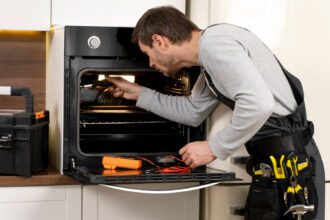As a homeowner, dealing with faulty appliances can be frustrating and costly. However, with some basic knowledge, you can decide when to take the DIY route and when to call a professional.
Understanding Your Appliances
Before we dive into the DIY vs. pro debate, it’s essential to understand how your appliances work. Familiarize yourself with the user manual, and research online tutorials specific to your appliance model.
Simple DIY Fixes
Some issues are straightforward and can be resolved with basic tools and knowledge. For instance:
- Loose screws or faulty connections: Tighten loose screws or replace faulty connectors.
- Clogged filters or drains: Clean or replace clogged filters, and clear drain blockages.
- Faulty fuses or tripped circuits: Replace blown fuses or reset tripped circuit breakers.
When to Call a Pro
However, some issues require specialized skills, tools, and expertise. If you encounter:
- Complex electrical or gas connections: Avoid risking electrical shocks or gas leaks; call a professional.
- Severe water damage or flooding: Professionals can assess and repair water-related damages safely and efficiently.
- Faulty thermostats or control boards: Diagnosing and replacing these components often requires specialized knowledge.
Appliance-Specific Considerations
Different appliances have unique challenges. For example:
- Refrigerator repairs: Unless you’re dealing with a simple issue like a faulty door seal, it’s best to call a pro.
- Oven repairs: If your oven is not heating properly or has electrical issues, consult a professional to avoid safety risks.
- Dishwasher repairs: Clogged filters or faulty detergent dispensers can be DIY-ed; however, more complex issues require a pro.
Safety Concerns
When in doubt, prioritize safety. If you’re unsure about:
- Electrical safety: Avoid risking electrical shocks; call a licensed electrician.
- Gas safety: If you suspect a gas leak or faulty connection, evacuate the area and contact a professional.
- Fire hazards: If your appliance is producing sparks, smoke, or unusual odors, shut it off and call emergency services.
Time and Cost Considerations
Weigh the time and cost of DIY repairs against calling a pro:
- Time-consuming repairs: If you’re short on time or not comfortable with lengthy repair processes, call a professional.
- Cost of replacement parts: Calculate the cost of replacement parts versus the cost of hiring a pro.
When dealing with faulty appliances, it’s crucial to assess your skills and knowledge before deciding between DIY and calling a professional. Remember to prioritize safety, consider appliance-specific challenges, and weigh time and cost factors. By doing so, you’ll ensure efficient and effective repairs that minimize downtime and expense.
Additional Tips and Resources
- Manufacturer resources: Consult your appliance’s user manual and manufacturer website for troubleshooting guides and repair tutorials.
- Online forums and communities: Websites like Reddit’s DIY community or appliance-specific forums can provide valuable insights and advice from experienced individuals.
- Local repair services: Research local, licensed, and insured repair professionals in your area for reliable assistance.
By following these guidelines and considering the complexities of each situation, you’ll be well-equipped to make informed decisions about when to DIY and when to call a pro for appliance repairs.
